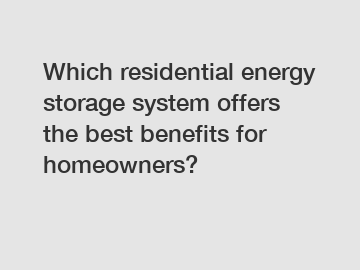Which residential energy storage system offers the best benefits for homeowners?
Which Residential Energy Storage System Offers the Best Benefits for Homeowners?
In recent years, the demand for residential energy storage systems has been on the rise. With increasing concerns about climate change and rising electricity costs, homeowners are looking for ways to reduce their carbon footprint and save money on their energy bills. Residential energy storage systems, such as batteries, can play a crucial role in achieving these goals. However, with several options available in the market, it can be overwhelming for homeowners to choose the right system that best suits their needs. This article will explore and compare the benefits of different residential energy storage systems, helping homeowners make an informed decision.
1. Lithium-Ion Batteries: Affordable and Efficient.

Lithium-ion batteries are one of the most popular options in residential energy storage systems. They are widely known for their high energy density, efficiency, and long lifespan. Lithium-ion batteries can store excess energy generated by renewable sources, such as solar panels, and use it during times of peak demand or when the renewable resource is not available. These batteries can help homeowners reduce their reliance on the grid and protect them from power outages. Additionally, lithium-ion batteries have become increasingly affordable in recent years, making them an attractive choice for homeowners.
2. Flow Batteries: Ideal for Long Duration Storage.
Flow batteries, also known as redox flow batteries, are an emerging technology in the residential energy storage market. These batteries use two electrolyte solutions that flow through separate tanks and are stored in external tanks. Flow batteries offer the advantage of storing energy for longer durations compared to lithium-ion batteries. They are particularly beneficial for homeowners who experience frequent power outages or want to have backup power for extended periods. Flow batteries also have a longer lifespan and can be cycled many more times without significant degradation, making them a reliable and durable option.
3. Lead-Acid Batteries: Cost-Effective but Limited.
Lead-acid batteries have been used in various applications for decades and are a more cost-effective option than lithium-ion or flow batteries. However, they have several limitations that make them less suitable for residential energy storage. Lead-acid batteries have a shorter lifespan, lower energy density, and lower efficiency compared to other battery technologies. Furthermore, these batteries require regular maintenance and ventilation due to the emission of potentially hazardous gases. While lead-acid batteries may be an affordable choice, their limited performance and maintenance requirements may outweigh the cost benefits in the long run.
4. Solid-State Batteries: The Future of Residential Energy Storage.
Solid-state batteries are an emerging technology that has the potential to revolutionize the residential energy storage market. These batteries use solid electrolytes instead of liquid or gel-based electrolytes, resulting in higher energy density and improved safety. Solid-state batteries offer increased lifespan, faster charging capabilities, and higher storage capacity. However, this technology is still in the early stages of development and not widely available in the consumer market.
In conclusion, when it comes to choosing a residential energy storage system, homeowners must consider their specific needs and requirements. Lithium-ion batteries are the most popular and affordable option, offering high energy density and efficiency. Flow batteries are ideal for homeowners who require backup power for longer durations. While lead-acid batteries are cost-effective, their limited performance and maintenance requirements make them less attractive. Solid-state batteries show promise for the future but are not yet widely accessible. Homeowners should thoroughly research and seek professional advice before investing in an energy storage system to ensure they choose the system that best aligns with their goals.
If you have any further questions or require assistance in choosing the right residential energy storage system for your home, please do not hesitate to contact us.
Keywords: contact us.
If you are looking for more details, kindly visit automotive agm start-stop battery, hitec battery, camel battery logo.

Comments